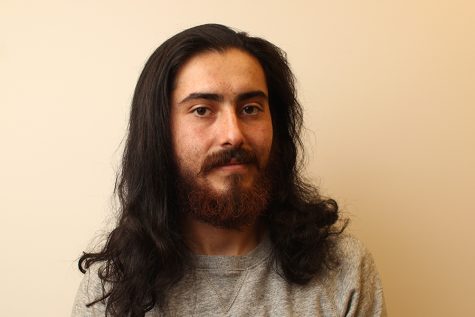‘Student voice’ resigns from presidential search board
Syon quits, district cannot fill void on committee
Feb 10, 2016
As the search to choose a permanent college president enters its final stages, the Screening Committee has lost its only student representative.
The Screening Committee, assigned to evaluate applications and interview candidates for the Contra Costa College presidency, will be without committee member and ASU President Nakari Syon as its members narrow the search to five semi-finalists.
Syon said he is quitting the committee due to an overwhelming schedule of activities.
The district Governing Board’s trustees will then reduce that number to three finalists to speak at an open forum in the Knox Center on March 3 and 4.
Syon, solicited by district Chancellor Helen Benjamin to be part of the Presidential Search Committee Advisory Board last year, removed himself on Feb. 1 from the process leading up to Dr. Benjamin announcing the district’s final decision on March 17.
“After meeting with the Dean (of Student Services Vicki Ferguson) I’m stepping back from participating in the search for CCC’s next president,” Syon said at the ASU meeting on Wednesday in AA-103. “I took the position because it was one of the requirements of being the ASU president, but I got to a point that it all became overwhelming.”
Ferguson said Syon met with her on Feb. 1 to discuss resigning from the Screening Committee because of time constraints due to his busy schedule.
At the meeting, Student Life Coordinator Erika Greene explained that the district is unable to fill the vacant student position on the committee because of its confidential information agreement with the Association of Community College Trustees Consultant, a search service for executive positions.
“Being part of the (presidential) search is another task that I cannot manage on top of chairing the (monthly) District Governance Council (DGC), weekly ASU meetings, Internal ASU meetings, my classes and work all while being student body president — I hope you all understand,” Syon said.
Social sciences major Elijah Williams said he understands Syon’s reason for stepping down from the committee.
“Your personal life can cause friction with responsibilities at school and you have to make a sacrifice,” Williams said.
Psychology major Angelica Serrano said while she doesn’t know exactly how much stress Syon is dealing with, she would “step back” from the committee as well if it became too overwhelming and started affecting her course work or her mental health.
Engineering major Travis Crane said he does not agree with Syon’s decision to resign from the committee.
“Not having a student perspective (on the committee) is definitely an issue,” Crane said. “Students’ needs should be reflected above departments’ needs (during the process). The new president needs to be someone who listens to students problems so they can be resolved — so the excuse that (Syon) has too much work won’t solve issues students have with the college.”
Greene said because Syon decided to step down he no longer has access to any of the presidential search advisory committee meetings, or candidate screenings. Syon will have to wait until the public forums in March to ask questions directly to the finalists or fill out a feedback sheet for Benjamin to review before consulting with the board.
“It comes down to involvement,” Greene said at the meeting. “A person would’ve had to have been part of the committee from the beginning to continue to have input,” she said. “Right now there is no student voice in the process.”
Interim College President Mojdeh Mehdizadeh said serving as DGC chairperson is a position that rotates among the ASU presidents at CCC, Diablo Valley College and Los Medanos College every four years.
This year it is Syon’s turn to coordinate the flow of monthly meetings at the District Office in Martinez.
“It takes a lot to step up and take leadership of DGC meetings on top of everything else,” she said. “It is not easy being ASU president, chairing DGC, while managing work and being a student, which is most important — but it is also important to have one’s priorities in order.”
“I think it is important to have a student representative throughout the decision making process,” she said. “I’m sorry we don’t — but I understand his decision to part with the process.”
Criminal justice major Tasia Scott said while she does not know specifics about the search, both students and faculty deserve an equal voice in selecting a college president.
“(The committee) should have a mix of students and staff who are involved and active on campus,” Scott said. “It needs people who know the culture of the campus.”
Ferguson said, “(Syon) may have wanted to represent the student body during this search for a president but he realized the additional work was too much of a strain on him — I respect his decision because it shows his ability to critically think of balancing life and school.”
She said Syon had the same responsibilities as faculty on the committee, but students often do not have as much control over their schedules.
According to the Governing Board Meeting Agenda in section 43A of Agreements and Amendments, the district paid search firm ACCT $40,000 to conduct the nationwide search.
Greene said that entails filling out an individual evaluation of candidates via ACCT’s website, and attending three meetings that can be an “all-day commitment.”
While the two first meetings, off campus, were held in early February, the final meeting in late February is from 8 a.m. to 7 p.m.
“It’s a heavy commitment,” Greene said. “Especially for a student.”
The Presidential Search Committee is now made up of 15 representatives from nine different groups on campus.
According to the Governing Board Meeting Agenda in section 43A of Agreements and Amendments, the district paid search firm ACCT $40,000 to conduct the nationwide search.


